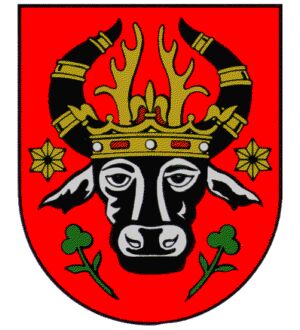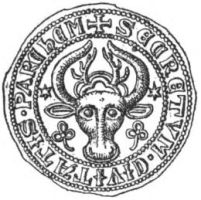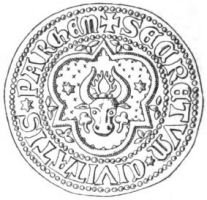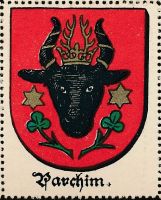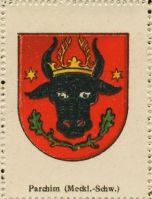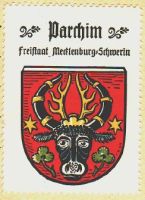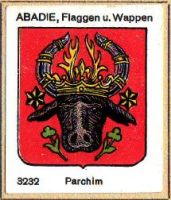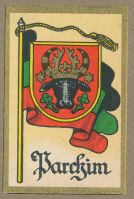Parchim
|
Country : Germany State : Mecklenburg-Vorpommern District (Kreis) : Ludwigslust-Parchim Additions:
|
| German | In Rot ein hersehender schwarzer Stierkopf mit schwarzen Hörnern, um die je drei goldene Binden geschlungen sind und eine goldene Krone, die fünf, abwechselnd mit Lilien und Perlen besteckte Zinken zeigt; zwischen den Hörnern, aus dem Stierkopf aufwachsend, die vierendigen Stangen eines goldenen Hirschgeweihs. Der Stierkopf ist beseitet: in Höhe des Kronenreifs von zwei sechsstrahligen goldenen Sternen, darunter von zwei, mit den Blättern schräg nach außen gekehrten grünen Kleestängeln. |
| English | blazon wanted |
Origin/meaning
The arms were officially granted on April 10, 1858.
Parchim was already mentioned in a charter from 1170 and (most likely) received city rights in July 1226 from Prince Heinrich Borwin III of Rostock. The city belonged to a number of rulers and came in 1436 finally to Mecklenburg.
The oldest city seal is known from an impression from 1293 and probably dates from the early 13th century. The bull's head with the crown is the symbol of the House of Mecklenburg. Heinrich Borwin III was the son of Heinrich Borwin II of Mecklenburg. The stars are most probably simply decoration. The trefoils in the lower half of the seal are either also decoration (in medieval times 'empty' spaces on seals were filled with these kinds of elements), or are a symbol for the importance of agriculture for the city.
The deer antler's as a kind of crest rising from the crown are unique for Parchim. They are not seen in other arms from rulers of Mecklenburg or cities in Mecklenburg. The meaning thereof is not known. Unlike the stars and trefoils, this is not a (common) form of decoration. It has been proposed that the antlers are derived from a crest of the arms of the Princes of Mecklenburg (but no image thereof exists), or that they indicate the forests around the city and/or an hunting area for the Princes.
The red colour probably dates only from 1858, as in older documents the field colour is mentioned as gold, similar to the arms of Mecklenburg and (nearly) all city arms using the Mecklenburg arms. Why it was changed is not known, but a local theory indicates that the golden colour of the arms on a wooden plaque in the city hall was either faded or gone, and the red/brown wooden colour became visible. Thus the city applied for a grant of arms with this colour instead of gold. In any case, in 1855 a version of the arms dating from 1855 in a church in Gischow the arms still have a golden field.
The city never tried to restore the original colour and the arms have not been changed since.
Image Gallery
The arms in an album from 1900
The arms in the Wappen-Sammlung (+/- 1910)
The arms in the Kaffee Hag albums +/- 1925
The arms in the Abadie albums
The arms in an album from 1931
This page is part of the German heraldry portal Deutsche Wappensammlung |
Heraldry of the World |
|
German heraldry:
|
Selected collector's items from Germany:
|
Contact and Support
Partners:
Your logo here ?
Contact us
© since 1995, Heraldry of the World, Ralf Hartemink 
Index of the site
